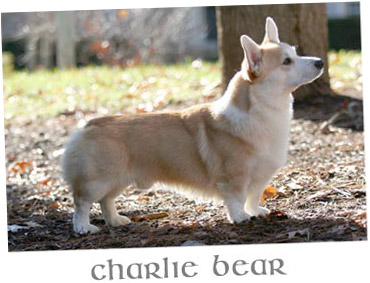Why Corgis?
Corgis are not for everyone. It's important to study any breed before you make a forever‐home commitment.
As Ria Niccoli stated in her book, because Corgis are 10 to 12 inches high and weigh "roughly from 18 to 28 pounds, he's a handy size to almost any situation: small enough to be easily cared for in a city apartment, yet substantial and hardy enough for country life." [1]
All pets deserve special time for love and attention, but Corgis – unlike other smaller breeds – require very little time for grooming. According to Deborah Harper, "One of the grandest attributes of the Pembroke Welsh Corgi is the coat. It sheds dirt, doesn't tangle and protects the dog from the temperature extremes." [2]
Corgis are very intelligent. They know what I'm thinking even before I do. Granted, I'm not the sharpest tool in the shed, but it was a little shocking at first to see a Corgi anticipate what I was going to do before I was even conscious that I had been thinking about it.
Corgis have done great as therapy dogs for seniors as well as service dogs to assist the hearing‐impaired. But according to Pamela Christie, "Some service dog organizations won't work with Corgis because the breed is a little too smart. Labrador Retrievers and Golden Retrievers will learn skills designed to help people and stop there, but Corgis often find ways to use those new skills for their own benefit. For instance... having learned how to open doors, (Corgis) start cutting class in order to go outside and play." [3]
Corgis can provide great solace after the death of a loved one or comfort you if you are sick. When I was down with the flu, Charlie Bear was worried about me and would paw at me while I was in bed. When a very dear friend died, I wanted to stay in bed, but Charlie Bear would have none of that. He pulled my covers off me and started nudging me to get up. His persistence and love helped pull me through that tough time.
According to Deborah Harper, "The Corgi has always been valued as a watchdog. His acute hearing alerts him to unusual sounds, and his big dog bark means business when something is amiss." [4]
From the ground to withers, a full‐grown Corgi should be 10 to 12 inches tall. Pamela Lane of Foxy Lane Corgis in Citra, FL, called Corgis "big dogs in small packages." [5]
Although Corgis can provide security, they are not dangerous dogs. Corgis are muscular and very strong, but even though the Corgis have a bold outlook, according to the Pembroke Welsh Corgi Standard, they are kindly and should never be shy or vicious. [6] We have never seen a vicious Corgi. On the extremely rare occasion that one of our Corgis met a stranger they didn't like while we were walking in the park, they would get between us and the stranger, but we have never seen a Corgi bite someone.
All dogs need exercise. Corgis can make excellent jogging or walking companions. Although Corgis can be the motivating factor to get you outside for some exercise, they are not hyper. According to Kathleen Mallery, Corgis are very active dogs." If it is not doing something with you, it can be found entertaining itself." [7]
A Corgi can enrich your quality of life in many ways. Corgis can open the door for social opportunities during walks and other fun activities. As Sarah Christie stated in "Corgi Diversions," Corgis "excel in obedience, agility, flyball, tracking and more, as well as their traditional herding activities." [8]
Corgi dogs should weigh 27 to 30 pounds, and bitches should weigh 25 to 28 pounds. Corgis love to eat, and they can con you into feeding them more than they need. But great care should be taken to not overfeed them, as it can cause serious health problems.
A great source for the breed standard and some great photos is "The New Illustrated Study of the Pembroke Welsh Corgi Standard," by Stephanie S. Hedgepath, Anne H. Bowes, Deborah S. Harper, Judy A. Hart, and Thomas Mathiesen. You can order this book and other great things at the Pembroke Welsh Corgi Club of America website www.pembrokecorgi.org.

